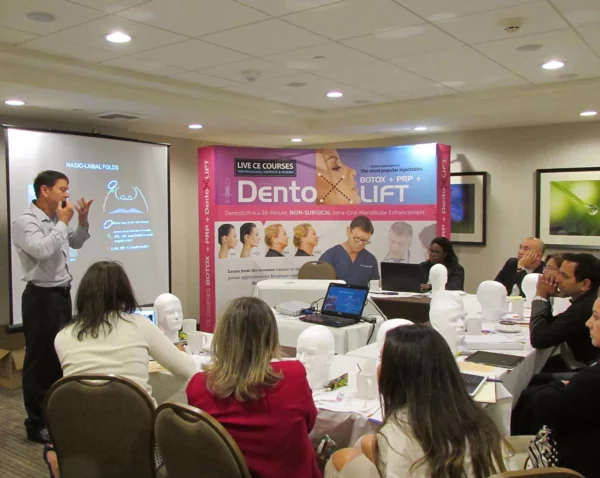Does your dentist show any enthusiasm for providing Botox treatments? Learn more about the requirements to practice dentistry in this field. When you acquire more information about the procedures and credentials necessary to broaden your dentistry practice into facial aesthetics.
Learn About Botox and Its Uses
Botox, which is made from botulinum toxin, is an effective treatment with several potential uses. The temporary paralysis of the underlying muscles brought on by this neurotoxin reduces wrinkles and fine lines. Botox has also been successfully used for medicinal purposes, besides its more well-known application in the beauty industry.
Dentistry has embraced Botox because of its ability to treat both oral and facial concerns simultaneously. Botox can be used to treat TMJ disorders and other causes of orofacial pain by relaxing the associated muscles. Dentists trained in facial esthetics can also use Botox to improve their patients’ smiles and smooth away wrinkles.

In order to administer Botox to patients safely and successfully, dentists must undergo extensive training.
Dentists must complete specific training in order to inject Botox safely and effectively into their patients. Dentists can better serve their patients’ ever-evolving requirements if they take a more all-encompassing approach to their oral and facial health.
Because of its many uses and high success rate, Botox is an invaluable tool for dentists. Dentists can improve their services and increase patient happiness by using this cutting-edge method.
Dentists’ Role in the Legal and Regulatory Framework for Botox Treatments
Dentists who want to administer Botox responsibly and in accordance with the law will need to familiarize themselves with the regulatory framework. The most important factors are as follows:
Dentists who want to administer Botox must be familiar with the legal and professional requirements and standards, such as those pertaining to their scope of practice, prescription authority, monitoring needs, and documentation.
Several states have additional laws in place, such as requirements for continuing education, supervision or collaboration mandates, or licensing requirements.
You should get in touch with the medical board in your state if you want up-to-date information, as the rules vary from state to state. Visit https://dentox.com/medical-dental-and-nursing-state-boards/ for a list of medical boards and their contact information.
It is essential to act in accordance with established standards of professionalism and ethical considerations. It is imperative that dentists put patient safety first, acquire the appropriate education and training, do comprehensive patient assessments, and use safe injection techniques.
Dentists can deliver safe and effective Botox treatments within the scope of their practice if they are aware of and follow the legal and ethical framework.
Training and Education Prerequisites
Certification as a dentist to administer Botox requires extensive prior education and continuous training. In order to provide Botox treatments, dentists need to undergo the following training and education.

Dentists need to complete a rigorous training program to get certified to inject Botox.
Training requirements for dentists interested in administering Botox
- Dental Degree: Dentists who want to administer Botox typically start with a DDS or DMD degree. This basic instruction covers oral health, anatomy, and dental treatments.
- Advanced Studies in Facial Aesthetics: Dentists who want to provide Botox treatments usually study facial esthetics. Through these studies, dentists learn about facial anatomy, rejuvenation procedures, and Botox injection safety.
The importance of continuous education in facial esthetics and Botox administration
Maintaining expertise in facial esthetics and the safe and effective use of Botox relies heavily on involvement in ongoing professional education. Dentists can provide their patients with safe, effective, and aesthetically acceptable results because of their commitment to lifelong learning. Some of the most important reasons to keep learning are as follows:
- Improving Clinical Skills: Dentists can improve their clinical abilities and broaden their scope of practice through participation in continuing education programs. Dentists can acquire the knowledge and skill to administer Botox with authority and safety through extensive education and training.
- Keeping Pace with Evolving Techniques: The practice of facial esthetics, which includes Botox injections, is rapidly developing. Dentists who commit to ongoing training are more likely to use the most recent, scientifically sound practices. They can use this information to give patients the cutting-edge care they deserve, in line with modern standards.
- Improved Patient Care: Dentists can now provide all-around treatment for their patients by acquiring additional skills in areas such as facial esthetics and Botox administration. Dentists who go beyond their usual practices are better able to care for their patients’ oral health as well as their general health.
Dentists can participate in specialized training programs
Dentists who are interested in learning more about Botox and facial esthetics can do so through a number of different training programs. These courses provide students with in-depth education, real-world experience, and professional credentials. Such instances are as follows:
- Courses and Workshops: Facial esthetics and Botox administration are popular topics in workshops and universities across the country. Facial anatomy, patient assessment, injection procedures, and treatment planning are just some of the subjects addressed in these courses. The structured learning environment that workshops and courses offer might be advantageous to dentists.
- Certification Programs: For dentists interested in incorporating Botox treatments into their practice, several professional organizations provide certification programs. To make sure dentists satisfy the necessary standards of proficiency, these programs frequently include a number of instructional modules, tests, and practical exams.
Dentists that participate in these specific training programs are better equipped to provide Botox treatments in their dental practices.
Dentox is a course designed to teach dentists and other medical personnel how to safely and effectively administer Botox. Dentox can help you grow your business and provide better care to your current clients.
Now is the time to start learning about botox from specialists by enrolling in a course. If you put in the time to learn, you might soon be able to perform miracles for every client who walks through your door. In addition to the live courses offered at https://dentox.com/live-courses/, online Botox training is available at https://dentox.com/all-courses/botox-training/.







